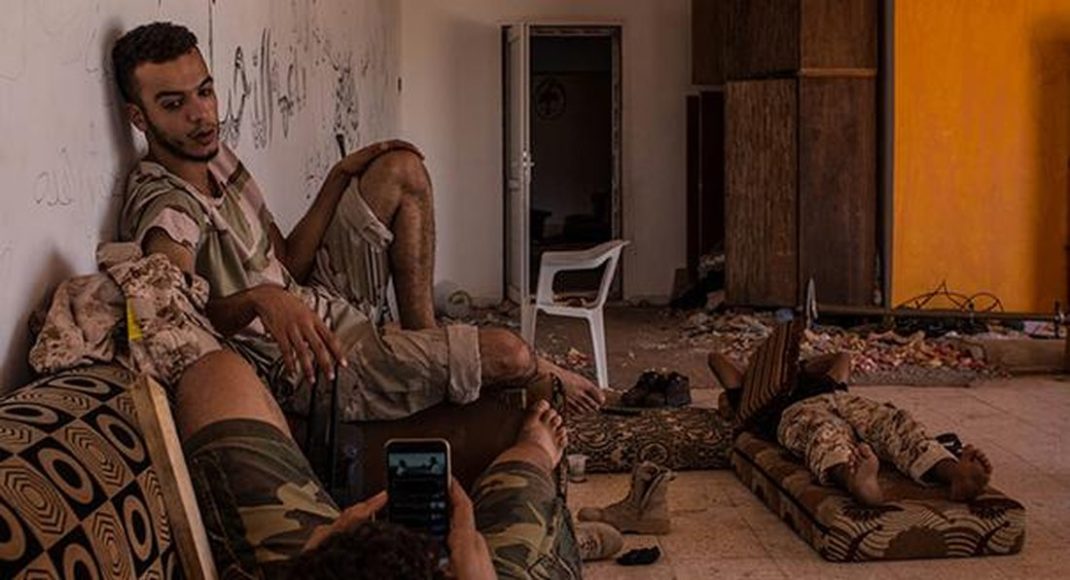By Michael Young
 In an interview, Rebecca Murray describes her recent trip to Libya and reports on the suffering there.
In an interview, Rebecca Murray describes her recent trip to Libya and reports on the suffering there.
Diwan interviewed her in late March to get her perspective on the situation in Libya following her recent visit to the country.
Michael Young: It has been nearly a year since Marshal Khalifa Haftar tried to seize Tripoli from the Government of National Accord (GNA). You’ve just returned from Libya. How would you describe the situation there today?
 Rebecca Murray: I arrived in Libya just as awareness of the danger of the new coronavirus was starting to gain ground.
Rebecca Murray: I arrived in Libya just as awareness of the danger of the new coronavirus was starting to gain ground.
After the usual hair-raising landing due to the frequent targeting of airports in the conflict, temperatures were taken at the small civilian terminal in Misrata.
This is the only place open to international flights in western Libya since Tripoli’s Mitiga airport was closed due to rocket attacks by Haftar’s Libyan Arab Armed Forces (LAAF).
It’s hard to find accommodation in Misrata and Tripoli, due to skyrocketing prices on packed hotels and rental apartments. Since the current conflict erupted, on April 4 of last year, an estimated 150,000 people have been forced to flee their homes along the Tripoli frontline and look for temporary shelter.
This on top of the thousands of those displaced in prior conflicts. Many of the properties they’ve left are now destroyed or looted. You can still glimpse a civilian car or two near the Tripoli frontline however, often belonging to those too poor to abandon their property, and with nowhere else to go.
Depending on whom you ask, exhausted civilians in Tripoli say they need to beat an ambitious Haftar, whom they view as a weak replica of Qaddafi or Egypt’s President Abdel-Fattah al-Sisi, and tackle homegrown militias after the war is won. Others want security and stability at any cost, if that is what Haftar will bring.
Meanwhile, LAAF artillery attacks are relentless, designed to indiscriminately harass Tripoli’s population in addition to taking out key military targets.
The oil blockade, imposed by communities allied to Haftar in January, is also exacting cruel collective punishment. People are suffering in the darkness, with widespread electricity, water, and gas cuts, and there’s little money in government coffers for oil-rich Libya to spend on fuel imports.
MY: You wrote an article last year describing the psychological toll of the ongoing battle for Tripoli on Libya’s youth. Can you tell us more about this?
RM: Many youths I met are fighters who cut their teeth in the 2011 uprising against Qaddafi, and later in the brutal battle to overthrow the Islamic State in Sirte in 2016.
Some have also fought in the numerous conflicts in between. Steeped in February 17 revolutionary ideology [for the day in 2011 when the uprising against the Qaddafi regime began], they form the core of volunteer Libyan fighters enrolled in a loose military coalition backed by the GNA.
Long gone are the conflict’s early days, when extravagant militiamen in designer clothes and luxury cars posed for photos along the frontline.
Then there are young civilians who are appalled by the war and the destruction of the state. Among them are businessmen, university students, and civil society workers.
Traumatized by years of militia rule, the proliferation of guns and the breakdown of institutions, many have personal stories of being held at gunpoint or kidnapped for ransom.
Local psychiatrists say they’ve seen a huge increase in visits by young fighters and civilians alike with symptoms of post-traumatic stress disorder, including an inability to manage rage and depression.
There are youths who talk to their friends for relief, while others turn to alcohol and drugs to cope.
In contrast to the hopes voiced of Libya becoming a “Dubai on the Mediterranean” after the 2011 revolution, Libya’s younger generation now see their future as bleak. Blocked by visa restrictions from traveling abroad, many say they are willing to try to escape by boat.
MY: What is the relationship between the GNA and militias in areas under the GNA’s control? And how are the dynamics of this relationship playing out in the broader struggle between the GNA and Haftar?
RM: Haftar’s predictions of an easy entry into Tripoli last spring did not materialize, and Tripoli’s largest armed groups have not yet flipped sides, mostly in fear of losing assets and turf.
But GNA Minister of Interior Fathi Bashagha has ratcheted up tensions with a counter-terrorism campaign to show the international community that the GNA is capable of the task, not Haftar, who has defined his war as one against militias and terrorists.
Bashagha differentiates armed groups between the good ones who are ideological and security driven, and bad apples motivated by criminal gain.
The truth is messier, as is the history: The international community empowered armed groups in Tripoli by paying for protection upon the GNA’s shock establishment in early 2016.
Views held by GNA backers, including in Bashagha’s hometown of Misrata, are decidedly mixed.
While some cheer the campaign against entrenched corruption, others question the timing and whether it will exacerbate rifts, just when GNA-backed forces are focused on defending Tripoli from the LAAF who have encircled the capital.
MY: Can you describe what changes the Turkish military presence on the side of the GNA has brought to Libya in recent weeks?
RM: In a visit to the Tripoli frontline last fall, morale seemed to have plummeted among the GNA-backed coalition.
United Arab Emirates-bought drones were targeting fighters, medical workers, and field hospitals, as well as the mixed-use airports of Mitiga and Misrata, with terrifying airstrikes.
Turkey decided in December to inject fighters and weapons to bolster the GNA alliance after a controversial agreement with the GNA gave it reach over eastern Mediterranean gas fields.
This has shifted the battle around Tripoli markedly.
Sophisticated Turkish anti-aircraft systems to deter drone strikes have certainly been effective, as have the additional Syrians recruited to bolster Libyan fighters to face off against LAAF nationals, as well as against foreign mercenaries, including skilled Russian snipers and fighters from Sudan and Chad.
But one Misratan military commander told me that when the Turkish aid arrived, the Turks were also heavy-handed in their decisions over how the battle was to be won.
The war is now in its most ferocious, wide-ranging phase, with attacks from the air, ground, and sea playing out between the sides in territory stretching from Sirte to the Libyan-Tunisian border.
MY: Recently, the United Nations envoy Ghassan Salameh stepped down, citing health reasons, which underlined the unlikelihood of a negotiated solution in Libya. In light of this, what worries you in the coming weeks and months in the country?
RM: Before Salameh resigned, he repeatedly warned international powers about the ramifications of the war for Tripoli. “If we don’t do anything, I fear a bloodbath,” he told one audience in Rome last December. “We’ve met the UN Security Council fifteen times and can’t get members to agree on a ceasefire.”
Salameh’s deep frustration with meddling states in Libya was palpable. The initial goal of the failed Berlin Conference in January to address international proxies in Libya was sabotaged, just as the UN-backed gathering of Libyan stakeholders in Ghadames in April 2019 to hammer out details of a peace process, including elections, was derailed by Haftar’s surprise attack on the capital.
After one year of the current conflict, fighters and residents are fatigued. Bewilderment has turned to bitterness because of their perceived abandonment by international allies with whom they fought against the Islamic State in Sirte and that had backed the GNA in the first place.
Many Libyans lament the betrayal of the United States especially, which has largely remained ambiguous in its support.
France has seemingly thrown its diplomatic lot behind Haftar, tying up effective European Union and UN Security Council decisions, and joining stalwart supporters of Haftar—the UAE, Russia, Egypt, and Jordan. The GNA’s sole material support has come from Turkey, but with heavy transactional demands.
The air and ground war, largely equipped by international powers, has revealed the UN arms embargo to be toothless.
The current political process, backed by the United Nations Support Mission in Libya, is trying to push forward, but is similarly ineffective right now.
MY: How probable is it that the conflict will turn into a direct confrontation between the foreign sponsors of the GNA and Haftar?
RM: Libya is notoriously hard to predict, so it’s best to summarize where we are now. Foreign powers continue to arm both sides and the fighting has escalated, with Turkey’s support producing notable results.
Civilians, now choked off from fuel supplies because of the oil blockade, are suffering in deteriorating conditions.
Land and air borders are closed due to the Covid-19 threat, and fighters on the frontline wear protective facemasks while shooting at each other.
Meanwhile, the UN and the international community have failed again in their latest public call for a ceasefire, as a means of refocusing a country trapped in a vicious civil war on combating the entrance of their latest enemy, the virus.
***
Rebecca Murray is a freelance journalist and field researcher who has been focused on the situation in Libya since 2012. She is a contributing author to the book The Libyan Revolution and Its Aftermath, published in 2015 by Hurst and Oxford University Press. Murray has also written from Libya for publications including Vice News, Al-Jazeera English, Middle East Eye, and Zenith, as well as for McClatchy.
___________





